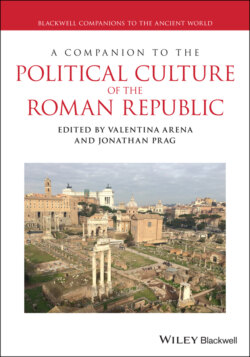Читать книгу A Companion to the Political Culture of the Roman Republic - Группа авторов - Страница 50
4.6 Commerce and Corruption
ОглавлениеStill, one might say, the interest that enlightened philosophes had in Roman republican freedom does not mean that eighteenth-century republicans themselves, fascinated as they were by ancient models, were able to adjust their ideals to the inescapable realities of modern society. The conflict between wealth (or commerce) and virtue, in eighteenth-century France, has in Rousseau’s first Discourse (1748: 3.3) its quintessential formulation: ‘Ancient politics were continually talking about mores and virtue; ours talk about nothing but commerce and money.’
However, contrary to the deep-rooted view that neoclassical political piety for Roman virtue necessarily implies a condemnation of commerce as such (Spitz 1995: Chapter 7; Baker 1990: 134, on Saige), what is deemed dangerous for nations is more precisely to make ‘commerce the only foundation of their strength’ (Saige 1770: 95 n. 11, emphasis mine; for Rousseau, see Spitz 2000: 22–26; Bachofen 2007). This claim is voiced in one important republican text of eighteenth-century France: Cato, or Conversation upon freedom and political virtues (1770) by Guillaume-Joseph Saige. In the twilight of the Roman Republic, Cato, Cicero and Favonius are conversing, and Saige’s notes in the margin reveal the contemporary diagnostic function of this conversation. In his first note commenting on ‘Cato’s’ account of the loss of Roman freedom, Saige (1770: 83 n. 1) not only relativises the gap separating the ancient Roman Republic and contemporary European states, he also contests that peoples have, on the whole, gained from the substitution of commerce for conquest as the main political goal – this replacement, he argues, provides us ‘the story of the progress of corruption in Modern nations.’
However, two misunderstandings should be dismissed at this point. First, although republicans usually denounce commerce and inequality as the corrupting forces of the mores of free peoples (see Rousseau 1750a: 19 sq.; Saige 1770: 11; Mably 1776: 16), their primary concern is not to make an austere republic of strictly equally poor and virtuous citizens come true, but to curb the growth of excessive wealth inequality, and thus of the dominating power, that inevitably follows such an unbridled pursuit of riches. Thus, while what makes the ‘progress of corruption’ dreadful is the growth of ‘base passions’ (Saige 1770: 11, see 8), these vices themselves are above all condemned for political motives: ambition and avarice are identified as ‘evils’ because they induce men to forfeit their independence for whatever these passions present as better goods. Mably (1758: 109–110, 185) concludes his similar account of the growth of luxury resulting from wealth inequality: ‘Here is Roman history.’ As Rousseau (1762: 2.11, 91) so neatly put this republican concern – having just claimed that ‘the greatest good of all’ and the ‘goal of all systems of legislation’ is ‘freedom and equality’ – ‘No citizen should be wealthy enough to be able to buy another, and no citizen poor enough to be forced to sell himself’ (see 1762, 3.15, 133; 1754: 123). This well-worn theme, which Saige (1770: 62–64) also illustrates from Roman history, will inspire variations from late eighteenth-century French republicans (Buonarroti 1828: 9–12).
The second mistaken inference would construe Saige’s doubt about the alleged benefit of the substitution of commerce for conquest as exposing him to d’Holbach’s objection that Roman virtue mainly amounted to violent infringement of the most ‘sacred rights of peoples’ (d’Holbach 1776: vol.1, 89, 126). Far from eulogising the virtues of warlike societies and proposing a return to the ancient aggressive politics of conquest, Saige claims the Romans lost their freedom only because Heaven punished their ‘ambition’, which led them to ‘violate’ the peoples’ ‘rights of nature’, being ‘enslaved’ by this imperialist politics spreading domination all over the world (Saige 1770: 14–17, 32; see Mably 1758: 221).
The fact that some French republican authors so easily illustrated their conception of individual natural rights with Roman authorities obviously does not mean that they drew it from them – even less that they would have been unable to articulate it without them. But whatever a comprehensive account of this intellectual phenomenon might reveal, disregarding it would mean equally missing not only the peculiarity of these eighteenth-century authors’ political thought, but also the forms taken by the reception of Roman republican thought.
